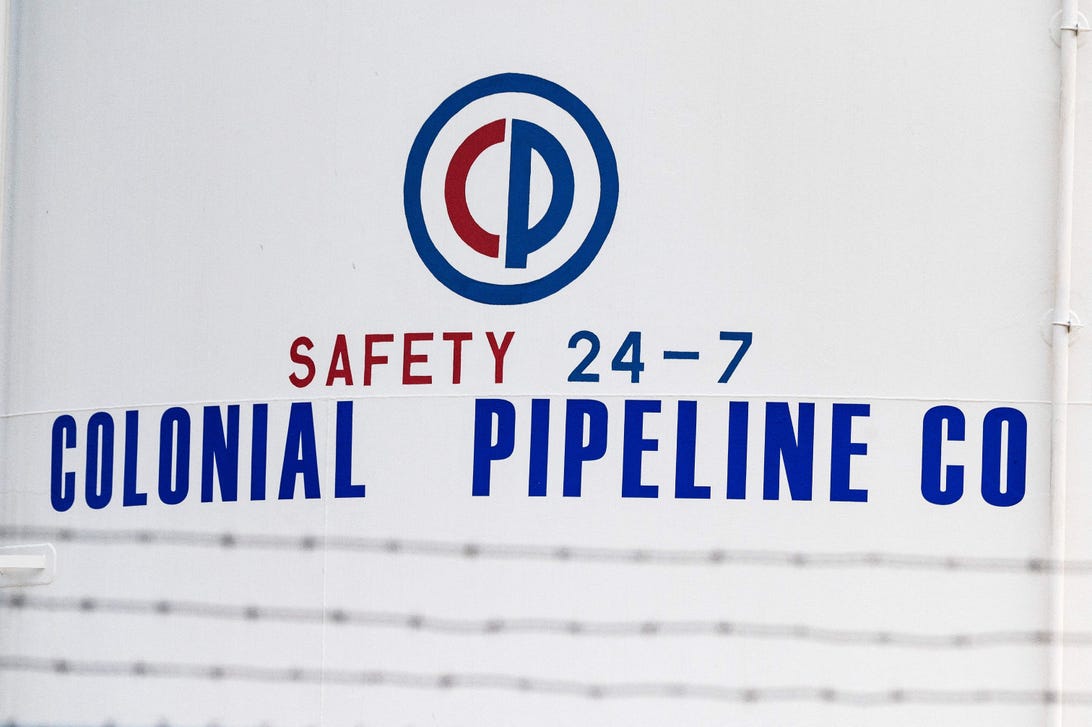
Colonial Pipeline was the target of a ransomware attack that forced it to shut down operations.
Getty ImagesA major US petroleum pipeline that's been shut since last weekend will resume operations on Wednesday, but markets disrupted by the closure may take days to return to normal. Colonial Pipeline, which shut operations after a ransomware attack, said it would transport as much gasoline, diesel and jet fuel as it could safely move to restore markets affected by the emergency closure.
"It will take several days for the product delivery supply chain to return to normal," Colonial said in an update posted to its website. "Some markets served by Colonial Pipeline may experience, or continue to experience, intermittent service interruptions during the start-up period."
The ransomware infection at Colonial has highlighted the vulnerability of the country's critical infrastructure, which has been the target of an increasing number of cyberattacks. The company, which operates the main gas artery along the East Coast, shut down the pipeline on Friday in order to contain ransomware discovered on its computer systems.
The FBI blamed the attack on a group called Darkside. Colonial isn't planning to pay the ransom, according to The Washington Post, and is working with a cybersecurity firm to restore its data.
The shutdown has affected the supply of gas in parts of the East Coast, with some people waiting an hour or more at filling stations. Federal and state officials have warned against lining up at the pump but that hasn't prevented panic buying.
Here's what you need to know about the hack:
What happened?
Colonial Pipeline was hit with a ransomware attack. Bloomberg reported that the hackers began their attack on Thursday by stealing about 100 gigabytes of data as part of a double extortion scheme. The company shut some of its operations to prevent the malicious software from spreading.
What's a ransomware attack?
Hackers use ransomware -- a type of malware -- to scramble a company's computer data and hold it hostage until a ransom is paid. In a double extortion scheme, the attackers pilfer the data and threaten to publish it.
On Wednesday, The Washington Post reported that Colonial wasn't planning on paying a ransom to the hackers. Instead, it was working with a cybersecurity firm to restore data from backup systems, the paper reported, citing people who were familiar with the situation.
Colonial didn't respond to a request for comment.
How did Colonial respond?
The company, which operates pipelines for gasoline, jet fuel and other refined petroleum products, halted pipeline operations after discovering the hack. Colonial said it "proactively took certain systems offline to contain the threat, which has temporarily halted all pipeline operations, and affected some of our IT systems."
The company said it aims at "substantially restoring operational service by the end of the week."
Colonial services seven airports and operates in 14 states. Its system is the biggest in the US, the company says, covering more than 5,500 miles and carrying more than 100 million gallons of fuel per day. A legend on its company's tanks, featured on its website, reads "America's Energy Lifeline."
On Wednesday, Colonial said it was beginning to restart its pipeline though it cautioned several days would be needed to bring the situation back to normal.
Energy Secretary Jennifer Granholm tweeted news of the reopening and suggested more information would follow soon.
We just got off the phone with #ColonialPipeline CEO. They are restarting pipeline operations today at ~5pm. More soon.
— Secretary Jennifer Granholm (@SecGranholm) May 12, 2021
Who's behind the attack?
The FBI blamed Darkside, a hacking group, for the attack. The law enforcement agency said it was notified of the hack on May 7 and is investigating alongside the company and other government agencies.
Cyberreason, a security company based in Boston, wrote that Darkside focuses on targets in English-speaking countries and avoids operations in former Soviet bloc countries. It sells its ransomware, a model known as ransomware as a service, and maintains a help desk for negotiations with victims, Cyberreason said.
How prevalent are ransomware attacks?
Unfortunately, they're pretty common. City governments around the country, including Baltimore's and Atlanta's, have been slammed by ransomware attacks. Hospitals have been shut down. (In one case, a patient died because she had to be taken to a hospital nearly 20 miles away from her initial destination, which was dealing with a cyberattack.)
Often, the victims pay to recover their data. Two cities in Florida -- Lake City and Riviera Beach -- together paid more than $1 million to unfreeze their systems. The cities paid in bitcoin, a popular cryptocurrency.
The White House said Tuesday evening that the Cybersecurity and Infrastructure Security Agency and the Department of Energy are working with industry on guidelines to secure critical infrastructure, sharing details on the attack that hit Colonial Pipeline and providing recommendations to reduce the likelihood of future incidents. The Biden administration added that it's helping private sector companies improve their cybersecurity through the Industrial Control Systems Cybersecurity initiative.
What's been going on with concerns about a gas shortage?
A Department of Transportation agency posted a regional emergency declaration for 18 states and Washington, DC, "in response to the unanticipated shutdown of the Colonial pipeline system due to network issues that affect the supply of gasoline, diesel, jet fuel, and other refined petroleum products throughout the Affected States." The declaration is designed to keep the fuel supply on the East Coast flowing.
North Carolina, South Carolina and Virginia have also declared states of emergency.
So I shouldn't hoard gas?
Officials say there's no need to stock up on gasoline because the pipeline is expected to be back near normal at the end of the week.
Energy Secretary Jennifer Granholm acknowledged that some states might experience a supply crunch but said there was no need to rush to the pumps. "We know that we have gasoline," Granholm said, according to US News and World Report. "We just have to get it to the right places."
South Carolina Gov. Henry McMaster tweeted a similar message to his state's citizens. "There is no need to rush to top off your gas tanks or hoard gas," McMaster wrote, "the pipeline is expected to resume operations by the end of the week."
There is no need to rush to top off your gas tanks or hoard gas - the pipeline is expected to resume operations by the end of the week.
— Gov. Henry McMaster (@henrymcmaster) May 11, 2021
In its Tuesday statement, Colonial said it's working with the Department of Energy and prioritizing "markets experiencing supply constraints and/or not serviced by other fuel delivery systems."
What about gas prices?
The shortage has caused an increase. On Wednesday, the average price per gallon of gas in the US jumped to $3.02, according to GasBuddy, a pricing app. A GasBuddy analyst told MarketWatch that the rise reflected the reopening of the US economy though it may have been accelerated by the pipeline shutdown. The price was the first time gasoline topped $3 in six years, according to the publication.
"really" - Google News
May 13, 2021 at 02:45AM
https://ift.tt/2SP3dI1
Gas shortage 2021? What you really need to know about the pipeline hack - CNET
"really" - Google News
https://ift.tt/3b3YJ3H
https://ift.tt/35qAk7d
Bagikan Berita Ini















0 Response to "Gas shortage 2021? What you really need to know about the pipeline hack - CNET"
Post a Comment